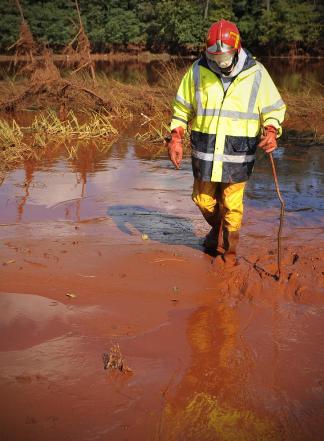 Thousands of Hungarians affected by a massive wave of toxic sludge will never return home after the country’s Prime Minister said their villages should be “written off” as it was “impossible for people to live here”.
Thousands of Hungarians affected by a massive wave of toxic sludge will never return home after the country’s Prime Minister said their villages should be “written off” as it was “impossible for people to live here”.
Viktor Orban spoke as he visited the three villages that were engulfed on Tuesday when one million cubic metres of red slurry tore through them after a residue reservoir at an aluminium plant burst its banks, affecting up to 7000 people over a 24km radius.
The red tide reached the Danube yesterday, Europe’s second-longest river. Tests had shown contamination of the water and fish are already dying. One Hungarian tributary has already been declared dead.
Amid fears of a large-scale international pollution disaster, officials of several countries through which the Danube flows downstream of the pollution entry point, including Croatia, Serbia and Romania, were yesterday testing the river every few hours, while in Hungary itself emergency crews were trying to dilute the effluent and its damaging high alkalinity.
As cleanup crews gathered deer carcasses and other wildlife from the villages in southwestern Hungary, environmental groups warned of long-term damage to the farming region’s topsoil.
 Hungary has appealed for international assistance in the clean-up, although it insisted that it had the financial capacity to cope. The cost could be millions of dollars.
Hungary has appealed for international assistance in the clean-up, although it insisted that it had the financial capacity to cope. The cost could be millions of dollars.
Four people were killed and 150 others injured when the 3m toxic wave struck. A further three people are still missing.
Orban told villagers that if it had hit at night, “everyone here would have died”.
The sludge, a byproduct of the refining of bauxite into alumina, the basic material for manufacturing aluminium, was being held at the village of Kolontar in a huge containment reservoir, more than 300m long and 450m wide, part of which collapsed in circumstances which are still unclear.
It emerged yesterday that the plant was placed on a 2006 list of sites which threatened to contaminate the Danube if there was an accident. The plant was one of 32 in Hungary identified by the authorities and should have been subject to greater inspections, said the International Commission for the Protection of the Danube River.
Orban suggested someone was clearly to blame. “Human error is more than likely. The wall [of the reservoir] did not disintegrate in a minute. This should have been detected.”
MAL Zrt, owner of the Ajkai Timfoldgyar alumina plant and the burst reservoir, said on Wednesday that there had been no sign of the impending disaster, adding that the last inspection of the reservoir on Tuesday had shown nothing wrong.
Hungary’s Environment Minister, Zoltan Illes, said the sludge covering a 41sq km swathe of countryside had “a high content of heavy metals”, some of which can cause cancer.
Etel Stampf, 76, was in her backyard when the first waves of the flood hit her home in Kolontar. She climbed on the roof of her pigsty to survive, but the flooding was so high that one of her legs was badly burned as it dangled in the caustic water.
“If I don’t die now, I never will,” she recalled thinking.
“We worked so hard for years to have something for ourselves and now it’s all gone. I don’t want to stay here. Ten years from now there will be nothing left of this town.”





